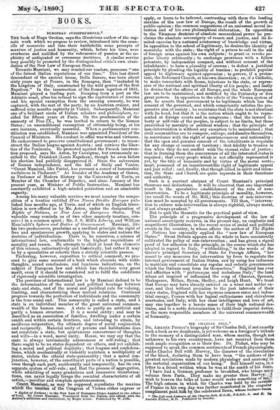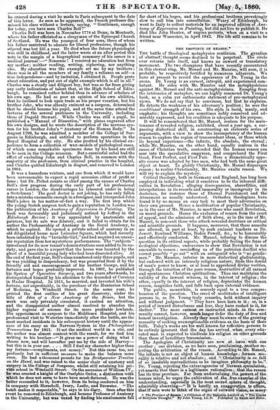ant CDARLES BELL. * Du. A,MEDEE Pienor's biography of Sir Charles
Bell, if not.exaotly such a book as we desMerate, is yetweleome as a foreigner's tribute to the memory of a distinguished man, whose merits, though not unknown to his own countrymen, have. not received from them such .ample recognition as is their due. Dr. Pichot, who may be supposed to speak, the common . sentiments:of French physiologists, ranks Charles Bell with Harvey, the discover of the circulation of the blood, declaring them to have been "the authors of the greatest. revelations made, by modern physiology and anatomy in the material organization of our being." Bell himself says,. in letter to a friend. written when he waa.at the zenith of his. fame, " I have had a. German, professor to breakfast, who brings me a volume from Paris., They. make me greater than Harvey. wish to heaven the folks at home would make something of me. The high esteem. in which Sir Charles was. held by the saves of France in his own day. was further manifested in the singular compliment paidldit by, the celebrated Roux, whose ea a • The Life and Labours 'of 'Sir Charles Bells £0, 1. 714484 14 and Z; Hi Amtdte Pichot, M.D. published by Bentley.
he entered during a visit he made to Paris subsequent to the date of this letter. As soon as he appeared, the French professor dis- missed his class without a lecture, saying, " Gentlemen, enough for today, you have seen Charles Bell!"
Charles Bell was born in November 1774 at Donn, in Monteath, where his father officiated:as a clergyman of the Episcopal Church of Scotland. He'was the youngest of four sons,three of whom his father contrived to educate for liberal professions, though his stipend was but 251. a year. He died when the future physiologist was still in childhood, and the latter wrote at an after period this note in the margin of a biographical summary of his career in a medical journal:—" Nonsense ! I received no education but from my mother ; neither reading, writing, ciphering, nor anything else. My education was the example set me by my brothers ; there was in all the members of my family a reliance on self—a true independence—and by imitation, I obtained it. People prate about education, and put out of sight example which is all in all." Charles was a steady and diligent boy, but was so far from giving any early indications of talent that, at the High School of Edin- burgh, he remained rather behind than in advance of scholars of his own age. He had so poor an opinion of his own abilities, that he inclined to look upon trade as his proper vocation, but his brother John, who was already eminent as a surgeon, determined that he should become his pupil, and at the same time attend the lectures of the several professors in the University, including those of Dugald Stewart. While Charles was still a pupil, he published a " Manual of Dissection," with plates engraved after his own designs, and he wrote the description of the nervous sys- tem for his brother John's "Anatomy of the Human Body." In August 1799, he was admitted a member of the College of Sur- geons in Edinburgh, and entitled to perform operations in the Royal Hospital of the city. He also profited by his clinical ex- perience to form a collection of wax-models of pathological cases, of which some remarkable specimens done by his hand are still to be seen in the College museum. But a successful cabal had the effect of excluding John and Charles Bell, in common with the -majority of the profession, from clinical practice in the hospital, and Charles quitted Edinburgh in disgust, and removed to London in 1804.
It was a hazardous venture, and one from which it would have been unreasonable to expect a rapid accession either of profit or fame ; but Dr. Pichot counts as chief among the causes of Charles Bell's slow progress during the early part of his professional career in London, the disadvantages he laboured under in being a Scotchman! The good doctor is not joking, he has only fallen into a mistake excusable enough in a foreigner, and interpreted John Bull's jokes in too matter-of-fact a way. The first step which the young Scotch surgeon took to gain a reputation in London was the publication of his Anatomy of Expression in Painting, The book was favourably and judiciously noticed by Jeffrey in the .Edinburgh Review ; it was appreciated by anatomists and painters, but its sale was dilatory, and it failed to obtain for its author the Professorship of Anatomy in the Royal Academy, to which he aspired. He opened a private school of anatomy in an old dilapidated house near Leicester Square, which had recently been inhabited by the "Invisible Girl," and had acquired an uncan- Die reputation from her mysterious performances. The "subjects" introduced for its new tenant's demonstrations soon added to its no- riety, and gave rise to a reporahat the house was haunted by the ghost of a beautiful young lady who had been dissected alive. At the end of the first year, Bell's class numbered only three pupils, and he was yielding to despondency, but was preserved from it by the friendly aid and encouragement of his brother George, and his fortunes and hopes gradually improved. In 1807, he published his System of Operative Surge7w, and two years afterwards, he distinguished himself by his attention to the wounded of Corunna in Hasler Hospital. In 1811, he married; and invested his wife's fortune, not unprofitably, in the purchase of the Hunterian School of Medicine, in : Windmill Street. In the same year, he printed the first outline of his great discovery, under the title of Idea of :a New Anatomy of the •Brain, but the work was only privately circulated, it excited no attention, and the disappointed -author almost resolved to abandon the higher regions of science for its more profitable lowlands. His appointment as surgeon to the •Middlesex Hospital, and his professional visit to Waterloo immediately after the battle, are the most marked incidents in his subsequent- until the appear- ance of his essay on the Nervous System in the Philosophical Transactions' for 11821.` ,It'set-the medical world in a stir, and the author was almost contentiwith the result; for we find him writing to his brother—" It givealne a power of doing what I choose now, and will hereafter put me by the side of Hary but this is in your ear. . • • Still I find my character higher than my fortune—compliments, not money." But this came too; • not profusely but in sufficient measure to make the balance more even. lie had a thousand pounds for his Bridgewater Treatise on the Iland,+ancl was raised to the senior'chair of anatomy and surgery in the College of Surgeons, whilst still retaining his pri- vhte school in Windmill' Street. On the accession of-William I V., be -was created', knight of the Guelphie Order, a distinction with Which he does not see:tn.-to have been much flattered. He was the better reconciled to •it; howeVer, from its being conferred on him in company with -Herschel', Ivory, Leslie, and Brewster. " The batch makes it respectable," he says in his diary. Soon after this event he removed to Edinburgh, and became Professor of Anatomy in the University, but was vexed by finding his emoluments fall far short of his hopes, and his professional brethren provokingly slow to call him into consultation. dreary of Edinburgh, he went to Italy to collect materials for an improved edition of Ana- tomy of Expression in Painting, but did not live to publish it. He died like John Hunter, of angina pectoris, when on a visit to a friend near Worcester, in April 1842. His life still remains to be written.



























 Previous page
Previous page